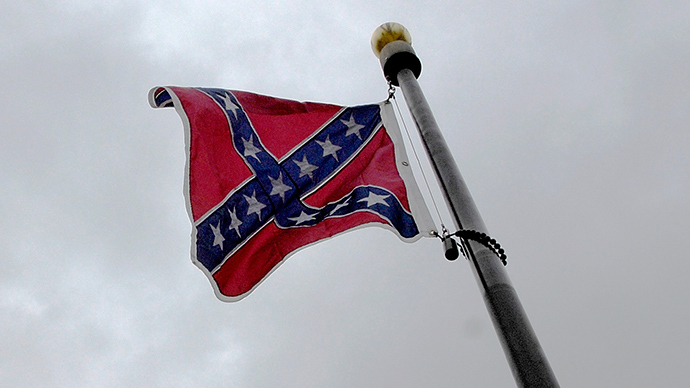Confederate flag in S. Carolina ‘belongs in a museum,’ not in the air – Obama

In the wake of a deadly shooting that involved a young white man gunning down nine African-Americans at a South Carolina church, new debate has opened up about the legitimacy of flying the Confederate flag on state grounds.
In fact, the White House even offered President Barack Obama’s view on the matter on Friday, as activists renewed calls for South Carolina to take down the Confederate flag waving in the air at the state capitol. In a nutshell, Obama believes it should be taken down.
“The president has said before he believes the Confederate flag belongs in a museum, and that is still his position,” spokesman Eric Schultz said to the media onboard Air Force One.
The flag itself has a divisive reputation for many Americans because of its use during the Civil War by America’s southern states, as they tried to secede from the North 150 years ago. For many, it remains a symbol of a brutal system of state-sanctioned slavery that the Confederacy fought to maintain. For others, it’s a symbol of heritage, history, and independence that they are proud to display.
Supporters of the flag are facing an extra wave of backlash, however, after a 21-year-old white man, Dylann Storm Roof, walked into a Bible study session in the historic Emanuel African Methodist Episcopal Church and killed nine people. He allegedly told victims they were targeted because of their race. He also reportedly drove a vehicle with a Confederate flag on the license plate.
READ MORE: Charleston church shooting suspect charged with 9 counts of murder, firearm possession
Since the shooting, both the American and South Carolina state flags have been lowered in honor of the victims, but the Confederate flag has remained waving at the top of its staff.
“We cannot have the Confederate flag waving in our capital,” said Cornell Brooks, the president of the National Association for the Advancement of Colored People, on Friday.
“The governor and state legislature have a responsibility to remove the flag,” Brooks added. “This is an antiquated discussion for 2015. It needs to come down.”
Many Americans agree, and have shown their support by joining a petition calling for the flag’s removal. So far, more than 219,000 people have signed the letter, created by MoveOn.org activists.
“The Confederate flag is not a symbol of southern pride but rather a symbol of rebellion and racism,” the petition reads. “On the heels of the brutal killing of nine Black people in a South Carolina church by a racist terrorist, it’s time to put that symbol of rebellion and racism behind us and move toward healing and a better United States of America!”
Despite criticism, however, the office of South Carolina Governor Nikki Haley said, unlike the US and state flags, the Confederate flag could only be brought down if local lawmakers signed off on the move.
“In South Carolina, the governor does not have legal authority to alter the flag. Only the General Assembly can do that,” a spokesperson told ABC News.
US Senator Lindsey Graham (R-South Carolina) also sounded off on the issue on Friday.
“When we see that symbol lifted up as an emblem of hate, as a tool of hate, as an inspiration for hate, as an inspiration for violence, that symbol has to come down,” he said.
READ MORE: Dixie’s flag falls again: Supreme Court rules Texas can reject offensive plate designs
Others defended the flag’s presence.
Ben Jones, the president of the Sons of Confederate Veterans, a group that aims to preserve the “history and legacy” of those who fought for the South in the Civil War, said the recent massacre is unrelated to the issues surrounding the Confederate flag.
“It has everything to do with the psychosis of racism and hate,” Jones said to Al Jazeera America. “This was a very sick — sick to the point of evil — person who committed these unspeakable acts. We’re not going to give up our First Amendment right or sentiments towards our ancestors to please some Northern, politically correct bullshit.”
The SCV itself was involved in another recent controversy over the Confederate flag, this time in Texas, where the group sued the state over license plates bearing the controversial symbol. Texas had rejected specialty plates featuring the flag, but SCV sued, arguing the state was violating free speech.
The Supreme Court ultimately ruled against SCV, finding that when a message appears on license plates, it becomes a government statement and not a private individual’s, and that states have the right to control their own speech, given that the government has to be able to speak in order to function.












